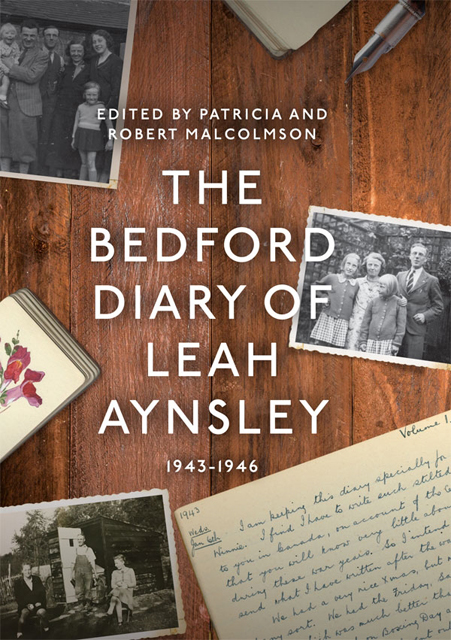Introduction
Published online by Cambridge University Press: 02 June 2023
Summary
‘I think I know why I keep a diary’, Leah Aynsley wrote on 3 May 1954. ‘Being single I want something of mine to live after me; I intend bequesting it to Bedfordshire Records Office and being written by a working-class person among whom I suspect not many will keep such diaries, it may be interesting in future centuries; also I find great pleasure in reading it occasionally.’ She thought, too, that her diary ‘is often useful to settle arguments as to what happened on such and such occasions.’ This was the second time in her writing that she had wondered about her reasons for diary-keeping. ‘Perhaps I hope that it will be published after my death’, she remarked on 11 June 1948, when she also speculated on her possible desire ‘to perpetuate myself, seeing I have no children’ – Samuel Pepys, she observed, had also been childless. (She had read Pepys’ diary in 1930, just after finishing and enjoying the diary of his contemporary, John Evelyn.) ‘Or perhaps I am like the person who carries a camera; I like to reproduce experiences on paper so that I can go over them at some future time and savour them again.’
Leah's self-identification as working-class is both noteworthy and apt. Her father, Michael, was an engineer's pattern maker. He and her mother Mary (née Richardson) – the former living in Sunderland, the latter in North Shields – had married in Tynemouth in October 1898. Both Leah's grandfathers were shipwrights. Seafaring and other forms of labour were well represented in both extended families, whose members had homes in various parts of the North-East. Leah was born on 16 January 1902, her two brothers, John and Jim, in August 1904 and December 1905 respectively. Given the depressed economy of the North-East after the Great War, Leah's parents had moved in 1921 with their three children (all then in their teens) to Bedford in search of better opportunities. Michael Aynsley, Leah's father, did succeed in finding employment and for around a decade he worked at Vauxhall Motors in Luton. From 1931 he was unemployed. Leah, and Michael's younger son, Jim, were probably from that time the main supporters of the household. John was then married and living in Luton. Leah's mother, Mary, had died of cancer in February 1928.
- Type
- Chapter
- Information
- The Bedford Diary of Leah Aynsley1943-1946, pp. 1 - 3Publisher: Boydell & BrewerPrint publication year: 2020

